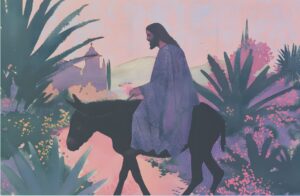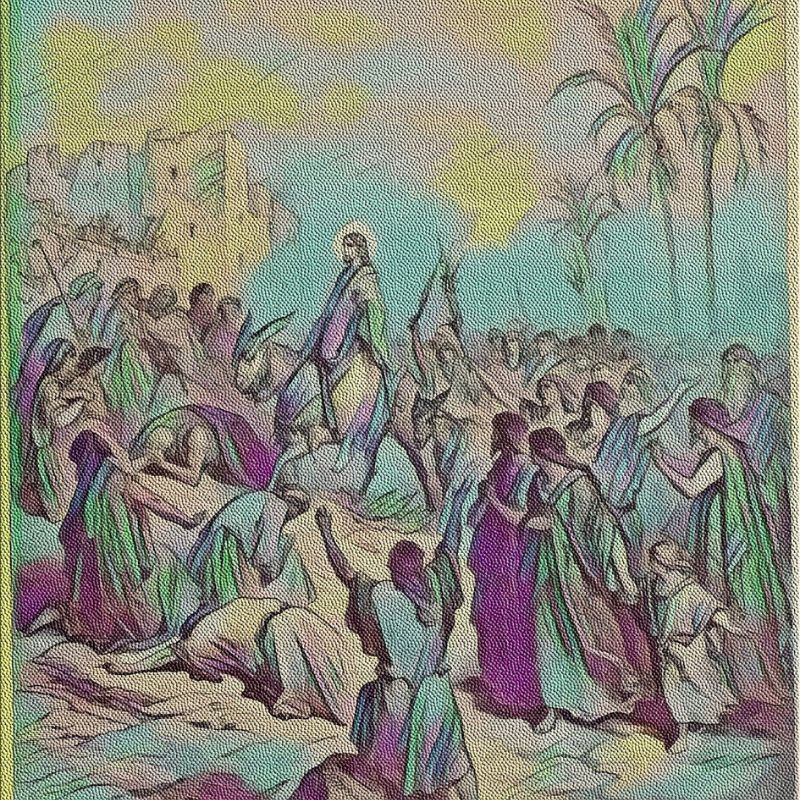Matthew 21:1-46 King James Version

Jesus’ Triumphal entry into Jerusalem, Cleansing of the Temple, the Cursing of the Fig Tree, and His Teachings on Faith
Matthew 21:1-46 King James Version. Matthew 21 illustrates key aspects of Jesus’ mission and authority, His fulfillment of prophecy, the importance of genuine faith and repentance, the condemnation of hypocrisy, and the inclusivity of God’s kingdom for those who respond to His call.
Matthew 21 marks a significant phase in Jesus’ ministry, detailing His triumphal entry into Jerusalem, the cleansing of the temple, the cursing of the fig tree, His teachings on faith, and His parables.
The Triumphal Entry – Verses 1-11

- Jesus instructs two disciples to fetch a donkey and her colt, fulfilling the prophecy of Zechariah 9:9.
- Jesus enters Jerusalem riding on the donkey, and the crowds spread their cloaks and palm branches on the road, shouting, “Hosanna to the Son of David!”
This event, often celebrated as Palm Sunday, signifies Jesus’ messianic entry into Jerusalem as a humble king, in contrast to a conquering military leader. It fulfills Old Testament prophecy and highlights the people’s recognition of Jesus as the Messiah, though their understanding of His mission may be incomplete
Jesus Cleanses the Temple – Verses 12-17
- Jesus enters the temple and drives out the money changers and those selling doves, declaring that they have made God’s house a den of robbers instead of a house of prayer.
- He heals the blind and the lame in the temple, and the children shout praises to Him, prompting the chief priests and teachers of the law to be indignant.
This act demonstrates Jesus’ authority over the temple and His zeal for true worship. It condemns the commercialization and corruption that had infiltrated religious practices, emphasizing the need for purity and genuine devotion.

The Cursing of the Fig Tree – Verses 18-22
- Jesus, finding no fruit on a fig tree, curses it, and it withers immediately. The disciples are amazed, and Jesus teaches them about faith and the power of prayer.
The fig tree symbolizes Israel, particularly its religious leadership, which outwardly appears fruitful but lacks genuine faith and righteousness. The cursing of the fig tree serves as a warning of judgment against unfruitfulness and hypocrisy. Jesus’ teaching on faith underscores the importance of believing in God’s power.
The Authority of Jesus Questioned – Verses 23-27
- The chief priests and elders question Jesus’ authority. Jesus responds with a question about the origin of John the Baptist’s baptism, which they cannot answer, so He refuses to tell them by what authority He acts.
This exchange reveals the religious leaders’ unwillingness to accept Jesus’ divine authority and their fear of losing their power. It highlights Jesus’ wisdom and the leaders’ hypocrisy.

Parable of the Two Sons – Verses 28-32
- Jesus tells a parable of a father who asks his two sons to work in the vineyard. One initially refuses but later goes, while the other agrees but does not go. Jesus explains that tax collectors and prostitutes, who initially lived sinful lives but repented, will enter the kingdom of God ahead of the religious leaders.
This parable emphasizes the importance of genuine repentance and obedience over mere lip service. It criticizes the religious leaders for their lack of true repentance and highlights the inclusivity of God’s kingdom for those who turn to Him.
Parable of the Tenants – Verses 33-46
- Jesus tells a parable about a landowner who leases his vineyard to tenants. When the landowner sends servants to collect the fruit, the tenants beat and kill them, and finally kill the landowner’s son. Jesus asks what the landowner will do, and they reply that he will bring those wretches to a wretched end and lease the vineyard to others who will give him his share of the crop.
- Jesus then quotes Psalm 118:22-23 about the stone the builders rejected becoming the cornerstone and declares that the kingdom of God will be taken from the religious leaders and given to a people who will produce its fruit.
This parable indicts the religious leaders for their rejection and mistreatment of God’s prophets and ultimately His Son. It foretells the transfer of God’s kingdom to those who will produce its fruits, emphasizing accountability and the consequences of rejecting God’s messengers.
Matthew 21:1-46 King James Version
1 And when they drew nigh unto Jerusalem, and were come to Bethphage, unto the mount of Olives, then sent Jesus two disciples,
2 Saying unto them, Go into the village over against you, and straightway ye shall find an ass tied, and a colt with her: loose them, and bring them unto me.
3 And if any man say ought unto you, ye shall say, The Lord hath need of them; and straightway he will send them.
4 All this was done, that it might be fulfilled which was spoken by the prophet, saying,
5 Tell ye the daughter of Sion, Behold, thy King cometh unto thee, meek, and sitting upon an ass, and a colt the foal of an ass.
6 And the disciples went, and did as Jesus commanded them,
7 And brought the ass, and the colt, and put on them their clothes, and they set him thereon.
8 And a very great multitude spread their garments in the way; others cut down branches from the trees, and strawed them in the way.
9 And the multitudes that went before, and that followed, cried, saying, Hosanna to the Son of David: Blessed is he that cometh in the name of the Lord; Hosanna in the highest.
10 And when he was come into Jerusalem, all the city was moved, saying, Who is this?
11 And the multitude said, This is Jesus the prophet of Nazareth of Galilee.

12 And Jesus went into the temple of God, and cast out all them that sold and bought in the temple, and overthrew the tables of the moneychangers, and the seats of them that sold doves,
13 And said unto them, It is written, My house shall be called the house of prayer; but ye have made it a den of thieves.
14 And the blind and the lame came to him in the temple; and he healed them.
15 And when the chief priests and scribes saw the wonderful things that he did, and the children crying
in the temple, and saying, Hosanna to the Son of David; they were sore displeased,
16 And said unto him, Hearest thou what these say? And Jesus saith unto them, Yea; have ye never read, Out of the mouth of babes and sucklings thou hast perfected praise?
17 And he left them, and went out of the city into Bethany; and he lodged there.
18 Now in the morning as he returned into the city, he hungered.
19 And when he saw a fig tree in the way, he came to it, and found nothing thereon, but leaves only, and said unto it, Let no fruit grow on thee henceforward for ever. And presently the fig tree withered away.
20 And when the disciples saw it, they marvelled, saying, How soon is the fig tree withered away!
21 Jesus answered and said unto them, Verily I say unto you, If ye have faith, and doubt not, ye shall not only do this which is done to the fig tree, but also if ye shall say unto this mountain, Be thou removed, and be thou cast into the sea; it shall be done.
22 And all things, whatsoever ye shall ask in prayer, believing, ye shall receive.

23 And when he was come into the temple, the chief priests and the elders of the people came unto him as he was teaching, and said, By what authority doest thou these things? and who gave thee this authority?
24 And Jesus answered and said unto them, I also will ask you one thing, which if ye tell me, I in like wise will tell you by what authority I do these things.
25 The baptism of John, whence was it? from heaven, or of men? And they reasoned with themselves, saying, If we shall say, From heaven; he will say unto us, Why did ye not then believe him?
26 But if we shall say, Of men; we fear the people; for all hold John as a prophet.
27 And they answered Jesus, and said, We cannot tell. And he said unto them, Neither tell I you by what authority I do these things.
28 But what think ye? A certain man had two sons; and he came to the first, and said, Son, go work to day in my vineyard.
29 He answered and said, I will not: but afterward he repented, and went.
30 And he came to the second, and said likewise. And he answered and said, I go, sir: and went not.
31 Whether of them twain did the will of his father? They say unto him, The first. Jesus saith unto them, Verily I say unto you, That the publicans and the harlots go into the kingdom of God before you.
32 For John came unto you in the way of righteousness, and ye believed him not: but the publicans and the harlots believed him: and ye, when ye had seen it, repented not afterward, that ye might believe him.

33 Hear another parable: There was a certain householder, which planted a vineyard, and hedged it round about, and digged a winepress in it, and built a tower, and let it out to husbandmen, and went into a far country:
34 And when the time of the fruit drew near, he sent his servants to the husbandmen, that they might receive the fruits of it.
35 And the husbandmen took his servants, and beat one, and killed another, and stoned another.
36 Again, he sent other servants more than the first: and they did unto them likewise.
37 But last of all he sent unto them his son, saying, They will reverence my son.
38 But when the husbandmen saw the son, they said among themselves, This is the heir; come, let us kill him, and let us seize on his inheritance.
39 And they caught him, and cast him out of the vineyard, and slew him.
40 When the lord therefore of the vineyard cometh, what will he do unto those husbandmen?
41 They say unto him, He will miserably destroy those wicked men, and will let out his vineyard unto other husbandmen, which shall render him the fruits in their seasons.
42 Jesus saith unto them, Did ye never read in the scriptures, The stone which the builders rejected, the same is become the head of the corner: this is the Lord’s doing, and it is marvellous in our eyes?
43 Therefore say I unto you, The kingdom of God shall be taken from you, and given to a nation bringing forth the fruits thereof.
44 And whosoever shall fall on this stone shall be broken: but on whomsoever it shall fall, it will grind him to powder.
45 And when the chief priests and Pharisees had heard his parables, they perceived that he spake of them.
46 But when they sought to lay hands on him, they feared the multitude, because they took him for a prophet.
You must be logged in to post a comment.